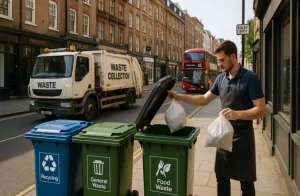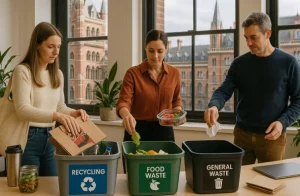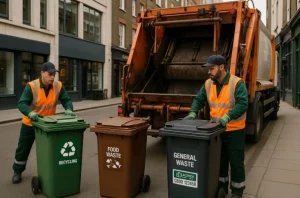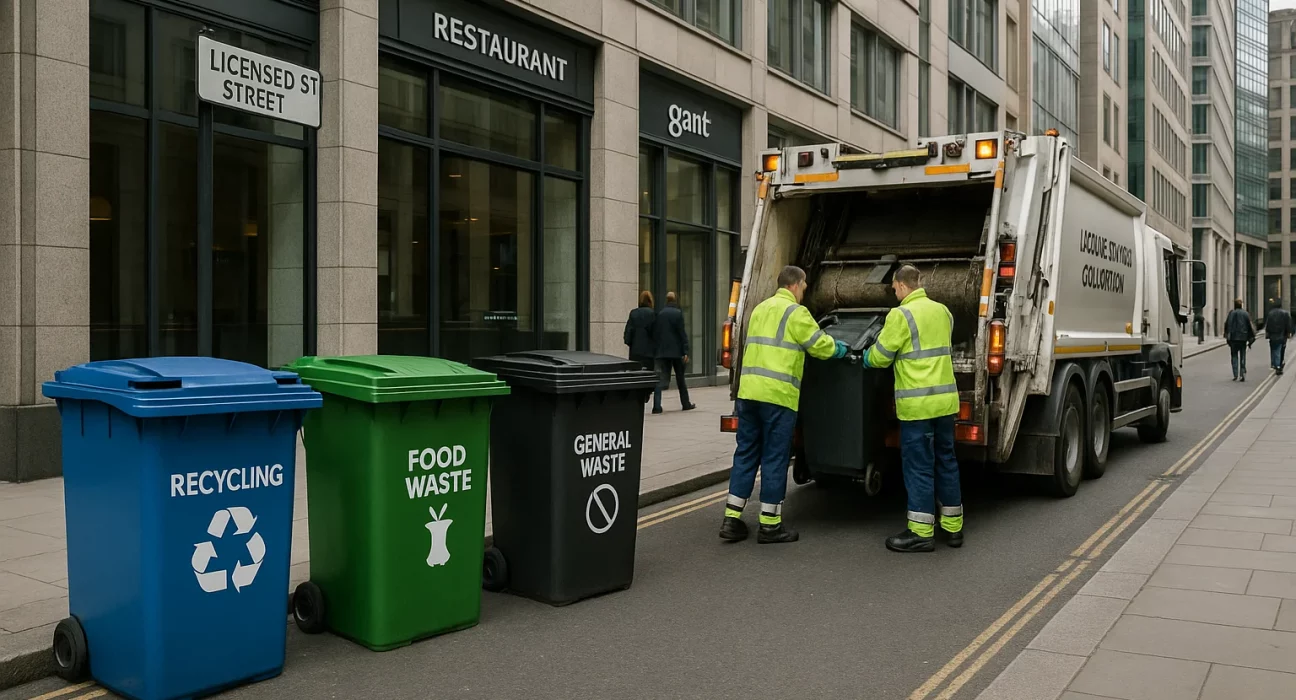Why Should Businesses in London Care About Waste Regulations?
In the heart of one of the world’s busiest cities, business waste management is becoming increasingly crucial. Whether you run a small retail shop in Camden or manage a large corporate office in Canary Wharf, the waste your business generates has significant environmental, financial and legal implications.
London’s rapid urban growth, combined with the UK’s sustainability commitments, has led to a stricter and more structured approach to waste regulation. While many business owners might view waste as a routine operational issue, it is now at the forefront of policy reforms.

These evolving regulations are designed not just to penalise poor waste management, but to guide businesses toward more sustainable, ethical and efficient disposal practices.
What Laws Govern Business Waste in London?
Commercial waste in London is regulated through a combination of national legislation and city-specific initiatives. Key legal frameworks include the Environmental Protection Act 1990, the Waste (England and Wales) Regulations 2011, and the Duty of Care Regulations 1991.
These laws form the backbone of the UK’s waste control, placing responsibility directly on businesses to ensure their waste is managed legally and sustainably.
In addition to these national rules, the London Environment Strategy, developed by the Mayor of London, outlines ambitious goals to reduce waste, improve recycling rates, and push the city towards a zero-waste future. This localised approach recognises that London has unique challenges due to its density, infrastructure and business diversity.
Under these regulations, businesses must:
- Ensure waste is stored securely
- Use licensed waste carriers
- Keep waste transfer documentation for at least two years
- Segregate waste where required (e.g., recyclables, hazardous waste)
Failure to follow these requirements can result in financial penalties, prosecution, or reputational damage.
How Do Local Councils Enforce These Waste Regulations?
Each of London’s 32 boroughs is responsible for enforcing business waste compliance. Enforcement typically includes inspections, waste documentation checks, and responding to reports of improper disposal. Councils have the authority to issue Fixed Penalty Notices for infractions such as using unauthorised waste carriers, fly-tipping, or failing to segregate recyclable materials.
Inspections may be random or targeted, particularly if a business has a history of non-compliance. Council officers may request to see a business’s waste transfer notes or evidence of service agreements with licensed providers.
A key part of enforcement is also educational. Many councils provide guidance and training resources to help businesses stay on top of their obligations. Nonetheless, repeated offences or gross negligence often lead to prosecution or substantial fines.
What Sustainable Waste Practices Are Being Promoted?

Sustainability is a major driver of waste regulation reform in London. The focus is not just on disposal, but on reducing waste at the source and maximising the value of materials through reuse and recycling. The Zero Waste London strategy aims to phase out landfill dependency entirely and promotes a circular economy approach.
Businesses are encouraged to:
- Separate waste into appropriate streams (e.g., dry recyclables, food waste, general waste)
- Reduce packaging and single-use plastics
- Work with suppliers to improve product lifecycle management
- Choose sustainable materials and packaging
- Partner with waste collectors who provide recycling insights
These practices are more than recommendations; in many boroughs, failure to segregate recyclable waste can now result in enforcement action. Using the services of a compliant waste partner, such as Rubbish Removal UK, a reputable rubbish removal company, can help businesses stay aligned with these sustainable practices while ensuring legal compliance.
How Are Different Industries Affected by These Regulations?
Waste regulations apply to all commercial activities, but their impact varies by sector. The hospitality industry, for instance, generates large volumes of food waste, making proper segregation and storage critical. Restaurants and cafes must often comply with food waste recycling mandates and pest-proof waste bin requirements.
Retailers, especially those involved in e-commerce, face increasing scrutiny over packaging waste. There’s a growing expectation for retailers to offer recycling schemes, minimise unnecessary packaging, and take responsibility for end-of-life product disposal under extended producer responsibility regulations.
Construction and industrial businesses must manage hazardous and bulky waste in line with specialised guidelines. Many projects require Site Waste Management Plans (SWMPs) that detail how waste will be minimised, reused, or recycled.
The following table summarises key requirements by sector:
| Sector | Key Waste Concerns | Regulation Focus Areas |
| Hospitality | Food waste, packaging | Waste segregation, pest control, recycling |
| Retail & E-commerce | Packaging, returns waste | Sustainable packaging, recycling schemes |
| Construction | Bulk materials, hazardous waste | SWMPs, authorised disposal methods |
| Offices | Paper, electronics, general waste | Secure storage, recycling policies |
What Are the Consequences of Non-Compliance?
Non-compliance with business waste regulations can be costly. Businesses may face fixed penalties, larger fines or legal action depending on the nature and severity of the breach. A common issue is the use of unlicensed waste carriers, which not only breaches the Duty of Care but may also lead to waste being fly-tipped, a criminal offence.
Fines range from £300 for failing to produce a waste transfer note, to over £5,000 for serious breaches such as illegal disposal or using unauthorised carriers. Repeat offenders may face court action and be named publicly, which can damage brand reputation significantly.
Furthermore, non-compliance can also result in operational disruption. For instance, if a council suspends a business’s waste collection privileges, it can lead to health and safety issues or even temporary closure in certain industries.
What Is the Role of Licensed Waste Collection Services?

Licensed commercial waste carriers play a critical role in helping businesses comply with regulations. These providers are registered with the Environment Agency and are responsible for collecting, transporting, and disposing of waste safely.
Using an authorised waste collector ensures:
- Legal compliance with disposal regulations
- Correct documentation through waste transfer notes
- Reliable waste stream separation and recycling
- Peace of mind in the event of a council inspection or audit
Additionally, many providers now offer digital dashboards and recycling reports, allowing businesses to track how much waste is being diverted from landfill. These insights can support corporate social responsibility (CSR) reporting and demonstrate commitment to sustainability.
What Does the Future Hold for Business Waste in London?
Looking ahead, waste management in London is poised to become even more sophisticated. Regulatory bodies are pushing for digital record-keeping, real-time waste tracking, and stronger data transparency. These efforts are being fuelled by the UK’s goal to achieve net-zero emissions by 2050.
There’s also a growing move toward Extended Producer Responsibility (EPR), where businesses must take greater responsibility for the waste generated from their products and packaging. EPR could reshape how products are designed, manufactured, and distributed.
Technological advancements will also play a role. From AI-powered sorting machines to smart waste bins with sensors, the integration of innovation promises to improve efficiency and reduce costs for compliant businesses.
How Can Businesses Stay Ahead of Compliance Requirements?
For most businesses, staying compliant isn’t just about avoiding fines, it’s about operating responsibly and maintaining a positive reputation. Developing a clear waste management strategy is the first step. This should include documented policies, regular staff training, and well-maintained records of all waste transfers.
Working with reliable waste service providers can reduce the administrative burden and provide guidance on changing legislation. Digital tools can also help by streamlining compliance through automated reminders, online document storage, and sustainability analytics.
Ultimately, businesses that go beyond minimum compliance, by reducing waste, promoting reuse, and engaging stakeholders, will benefit not just from a cleaner conscience but also from stronger customer loyalty and operational resilience.
Conclusion – Is Regulation Driving a Greener Business Future?
London’s waste regulations are more than just a legal framework, they represent a shift towards a cleaner, more responsible business culture. As these regulations continue to evolve, businesses have an opportunity to become environmental leaders within their industries.
By adopting best practices, collaborating with licensed carriers like Rubbish Removal UK, and aligning operations with local and national sustainability goals, London-based businesses can not only meet their legal obligations but also contribute to a healthier urban environment.
The path to compliance may require effort and investment, but it ultimately leads to a more efficient, respected, and future-ready business model.
FAQs
What waste documentation should a business in London keep?
Businesses must keep waste transfer notes for at least two years to prove legal disposal. This includes the type, quantity, and method of transfer.
Is recycling mandatory for businesses in London?
While not all waste types are subject to mandatory recycling, many boroughs require commercial recycling, particularly for paper, plastic, and food waste.
How can I check if a waste carrier is licensed?
You can check the Environment Agency’s public register online to verify if a waste collector is authorised to handle business waste.
Are food waste regulations different for restaurants?
Yes, restaurants and food businesses must follow stricter rules around food storage, waste segregation, and disposal to avoid hygiene and pest issues.
Can small businesses be fined for non-compliance?
Absolutely. Regulations apply to all business sizes. Small businesses can be fined if they fail to store, segregate, or dispose of waste legally.
What is the role of the Duty of Care in waste management?
It’s a legal requirement that obligates businesses to ensure waste is handled responsibly from generation to final disposal, using licensed providers.
What is Extended Producer Responsibility?
It is a policy approach that requires producers to take responsibility for the disposal of products and packaging they place on the market, especially at the end of life.









Leave feedback about this